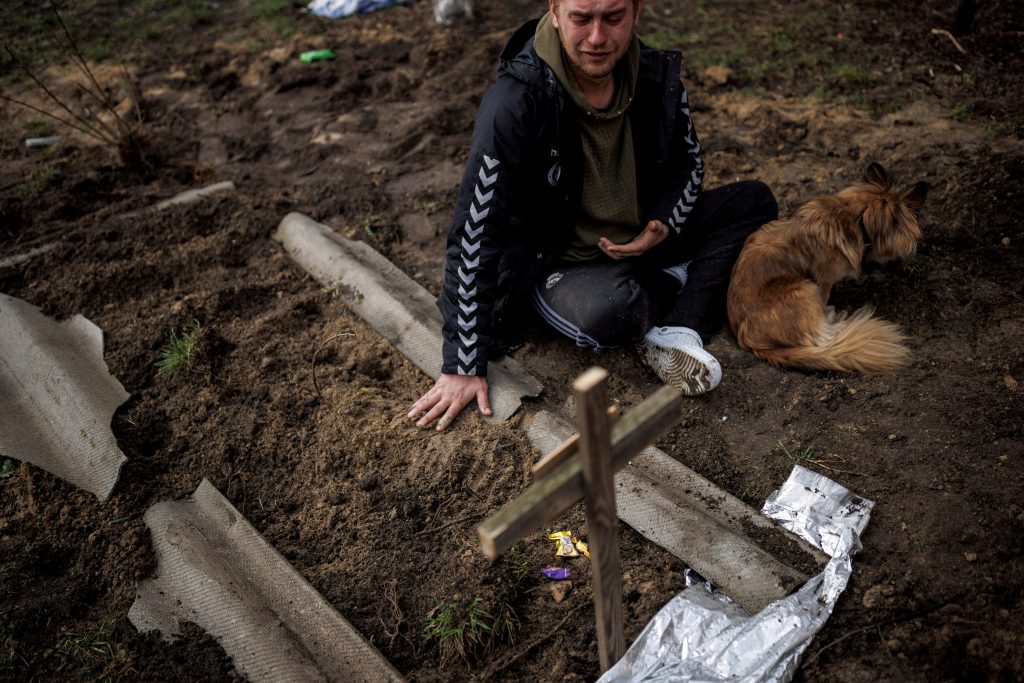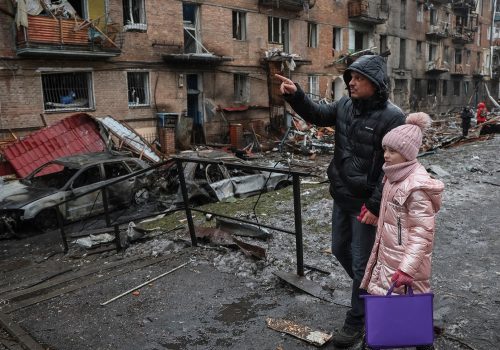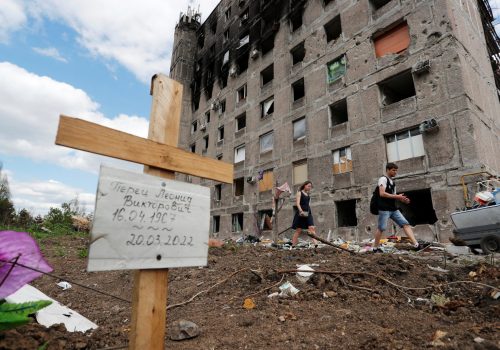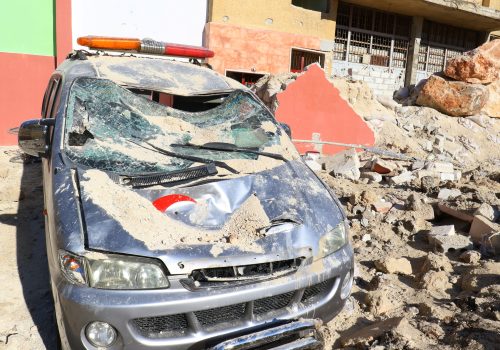This week, as Ukrainian President Volodymyr Zelenskyy made the rounds in Washington, Congress unanimously pushed through a critical piece of legislation designed to hold Russia accountable for its actions in Ukraine. Thursday’s US House passage of the Justice for Victims of War Crimes Act sends the bill to President Joe Biden’s desk. To learn more about the impact of the bill, we turned to Gissou Nia, a human-rights lawyer who leads the Atlantic Council’s Strategic Litigation Program—and who has been working behind the scenes to push the legislation through.
1. What has Congress just changed?
Congress has taken an important step to ensure accountability for war crimes. Under previous laws, authorities in the United States could only prosecute war crimes if the alleged perpetrator or victim were a US national. That meant that if a Russian soldier who committed war crimes against Ukrainian nationals came to the United States, they would be able to escape criminal prosecution for their crimes abroad. This week’s legal changes close that loophole. Now, US prosecutors can bring a prosecution for war crimes whenever the alleged perpetrator is on US soil, irrespective of where the crimes were committed or the nationality of the victims or alleged perpetrators.
2. Why did US lawmakers do this now?
Human-rights advocates have long been advocating for this legislative change, to ensure that US courts are equipped to support accountability for atrocity crimes committed globally. Government officials in the Department of Defense, State Department, and other government agencies have also long supported this change, as it brings US legislation in line with its obligations under the four Geneva Conventions. Russia’s full-scale invasion of Ukraine earlier this year brought renewed urgency to patching this legal gap, as more attention was paid to how the United States can support justice for Ukraine and ensure accountability for Russia’s unlawful actions. My team at the Strategic Litigation Project quickly started taking meetings on Capitol Hill to urge this change, and we were pleased to see Senators Dick Durbin (D-IL), Chuck Grassley (R-IA), Lindsey Graham (R-SC), and Patrick Leahy (D-VT), along with Representatives David Cicilline (D-RI) and Victoria Spartz (R-IN) introduce the bipartisan, bicameral legislation in May. This week’s passage—coinciding with Zelenskyy’s visit—is a clear demonstration of US support for Ukraine.
3. How is this different from International Criminal Court (ICC) prosecution for war crimes?
Although the ICC has jurisdiction over war crimes committed in Ukraine, it is still important to ensure that the United States and other nations can prosecute war crimes committed in Ukraine. The ICC has a limited mandate to prosecute the most serious crimes and high-level perpetrators, and only where national courts are not best suited to prosecute themselves. The potential cases that the United States could prosecute are more likely to be lower-level perpetrators who would not be on the ICC’s radar. These are perpetrators who would likely be coming to the United States to try to escape accountability for their actions abroad, evade scrutiny, and live a comfortable life. Closing this loophole will help prevent this from happening by ensuring that the United States will not be a safe haven for perpetrators of war crimes.
4. What might this mean for holding Russia accountable for its actions in Ukraine?
While this broadening of jurisdiction is important to ensure accountability, realistically it will not result in a substantial number of war crimes prosecutions for Russian actions in Ukraine. Prosecution could only happen if the alleged war criminal is physically present in the United States and if US prosecutors have sufficient evidence to support an indictment and proceed to trial. In addition, the legislation requires the attorney general’s office to approve that the prosecution is in the public interest and necessary to secure substantial justice. While the war crimes cases would be limited, this legislation can ensure that Russian war criminals who may end up in the United States in the future—on vacation or moving here to start a new life—cannot escape responsibility for their past crimes.
5. What might this mean beyond Russia?
The Justice for Victims of War Crimes Act applies worldwide and is not specific to Ukrainian victims of Russian crimes. The broadened jurisdiction will help ensure that any alleged perpetrator who arrives in the United States won’t escape accountability. The closure of this loophole will help ensure justice for victims of war crimes from the Central African Republic to Ethiopia to Syria and beyond.
Further reading
Tue, Dec 6, 2022
How Ukraine’s proposed special tribunal for Russian aggression would work
New Atlanticist By Celeste Kmiotek
A special tribunal on Russian aggression would raise questions around jurisdiction, legal details, and the role of the US. Here's how they can be addressed.
Thu, Dec 15, 2022
Individual Russians must be held accountable for war crimes in Ukraine
UkraineAlert By
Unless steps are taken to hold individual Russians accountable for the war crimes they have committed in Ukraine we will witness similar atrocities elsewhere, warns Ukrainian author and journalist Stanislav Aseyev.
Tue, Jun 14, 2022
Attacks on hospitals from Syria to Ukraine: Improving prevention and accountability mechanisms
Issue Brief By Elise Baker, Gissou Nia
When Russia invaded Ukraine on February 24, 2022, it soon began implementing one of its frequent—and criminal—tactics that it had already been using in its military intervention in Syria: bombing healthcare and medical facilities.
Image: FILE PHOTO: Serhii Lahovskyi, 26, mourns next to the grave of his friend Ihor Lytvynenko, who according to residents was killed by Russian soldiers, after they found him beside a building's basement, amid Russia's invasion of Ukraine, in Bucha, Kyiv region, Ukraine, April 6, 2022. REUTERS/Alkis Konstantinidis/File Photo TPX IMAGES OF THE DAY SEARCH "YEAR-END UKRAINE" FOR THIS STORY. SEARCH "YEAR-END" FOR ALL BEST OF 2022 PACKAGES./File Photo



